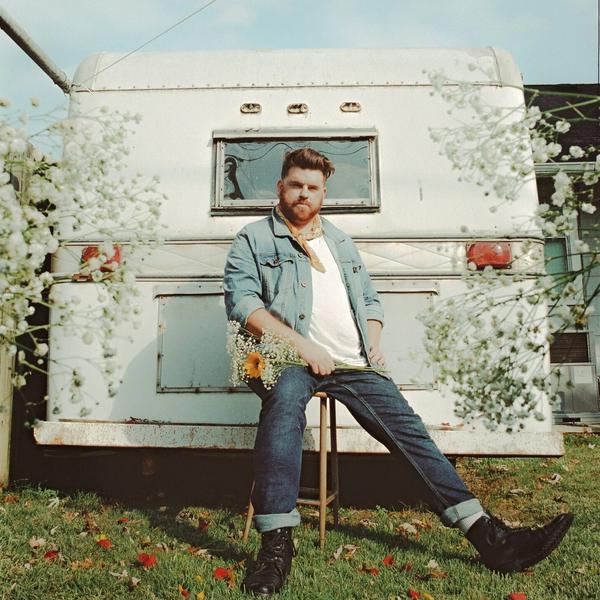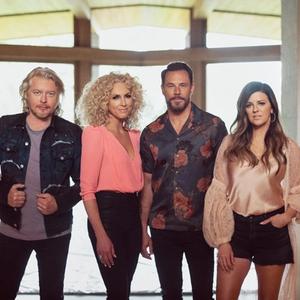




Link copied

For a significant part of his early career, Fancy Hagood worked beneath a shroud of major label dictation. Back in 2015, ‘Who Is Fancy?’, a campaign promoting his debut single, propelled the singer-songwriter to the forefront of pop conversation, whilst simultaneously keeping his identity a secret. Numerous videos featuring an array of lip-syncing actors stacked up millions of views on YouTube, national radio stations were quick to hop on the bandwagon and the rising enigma was even booking tour support slots with Ariana Grande and Meghan Trainor. It wasn’t until four months after the single’s release that Fancy was revealed during an appearance on The Tonight Show Starring Jimmy Fallon.
Perhaps it was to allow the message of his music to do the talking, or to briefly bypass industry vanity, but the fabrication of mystique around someone so characteristically exuberant – and with such a unique story to tell - was unbefitting. So, when the viral hype of his pop career floundered, Fancy opted to part ways with his broad management team – which included mogul Scooter Braun and pop powerhouse Republic – and migrate back to Nashville, in pursuit of regaining some agency over his artistry. He’s since rediscovered what had always been at the heart of his ambitions: to share his story and express his true self, no-holds-barred.
Growing up in a Christian family in Arkansas, Fancy (real name Jake) initially moved to Nashville aged 17. It was there, after establishing himself within a community of like-minded people, that he felt able to embrace his identity as a gay man - something that’s now become a defining feature of his self-branded Queer Southern Pop. Alongside writing credits for a whole host of big names, including Little Big Town, Fancy's recently released debut album, Southern Curiosity, is a declaration of growth, experience and pride - be it in who you are and where you come from. It’s a record, he says, which he hopes will “allow people to feel seen, and hear themselves in a medium that has ignored them for so long”.
Chatting over a Zoom call that he’s haphazardly propped up on his iPhone, Fancy’s candid and colourful temperament immediately shines through. Is it ironic, I ask, that behind all the manufactured mystery and glamour of ‘Who Is Fancy?’, was a man trying to answer the same question? “For me it’s poetic”, he answers with a smile. “I learned that the goal is to get to that main stage as myself - to show up with my own story, with what I want to contribute to the world. Being Fancy is truly my journey as an individual - there's no one else who can tell me how to play that game, because I made it.”
As he eloquently addresses cultural change in country music and the power of storytelling through songwriting – all whilst adorning a statement pair of gold-rimmed glasses with bright orange lenses – it’s quite clear that Fancy Hagood is an artist that can’t be veiled.

You’ve had a bit of a wild ride the past couple of months releasing your debut album. How does it feel to finally have it out in the world?
Oh, it's been really overwhelming. I've held Southern Curiosity really tightly for the last three years; we started working on it in 2018. I wanted to create this album away from any outside voices. I've done the major label thing, I've had big managers, but this time I didn’t want any sort of interference. So only once it was finished did we start building the team around it and finding the right people. It's been a long time coming but putting it out in the world is honestly just a big relief. You hold something so closely and it feels so precious, and then all of a sudden you release it, and it lives, it breathes, it's its own thing.
It must be quite the full-circle moment. You’ve been on such a journey to figure out exactly the kind of artist you want to be. Did you ever experience any hesitation in making the initial move from Nashville to LA?
No, I was so young and naïve when I signed to my first publishing deal, and I was so thirsty for it - I was willing to do whatever it took. Having all these big names validating my talent showed me that I could compete on the highest of levels, but LA was a means to an end from the second I got there. I was chasing that dream. It was only once I was already in the throes of it all when I realised, “Holy shit, what am I doing? Who am I?” No wonder they were calling me Who is Fancy? - I tried to be what everyone else wanted me to be, and when you have so many people with so many different ideas of who they think you should be, you lose yourself.
I'm out here making Motown records, rhythmic pop records, doing singer-songwriter stuff, but at the end of the day it just never panned out to be what anyone wanted. I listened to so many people at the cost of my own creativity. But being back in Nashville now, I'm surrounded by people who care about me as a person, not just as a product. This time around, it's not a thirst, it's a hunger.
The community you’ve become a part of in Nashville seems to have played such an integral role in shaping the artist you are today. What does the city and its people mean to you?
Nashville has just always been home to me. Coming back, I knew that I wanted to write about my queer experience in the South, and here I feel a sense of freedom to do so because people are all about songwriting - and what is songwriting if not storytelling? In LA, the conversation about my sexuality was still so controversial and polarizing. Everyone was just so fearful of what Middle America would think. But I am Middle America - I grew up in Arkansas, you can't get more Middle America than that. Here, I'm surrounded by people who I don't mind being vulnerable with; a community of friends who have rallied around me and made me feel seen in this town. When we write we're not just in a room trying to force a song or an album, we're really diving into my life. I feel like there's just more care there, if that makes sense.
Often people would expect pop music to be a ‘freer’ place to express yourself, particularly in comparison to country music, but your experiences suggest otherwise. Do you see the boundaries of genre to be particularly rigid or influential to how you approach writing?
The genre conversation is interesting. I wrote a lot of this album in London and that was where I became really inspired, because genre wasn’t really a thing there. It was one of the first times I was writing without the concept of genre being under the microscope and I finally felt so free. I don't know what country music is anymore, I don't even know what pop music is anymore, but that experience just proved to me that music is music – we shouldn’t be putting people in boxes. I don’t think I’d say I’m a country artist, but I also don’t think I’m a pop artist. I kind of came up with my own genre called Queer Southern Pop. Because I'm queer, I'm Southern and I want to be popular! All I want is to make sure the songs I write have integrity.
I feel on Southern Curiosity we built this musical landscape that matched what I was going for as a songwriter and storyteller, outside of any specific genre. It all just kind of added to the storyline of what it means to me to be gay in the South - I have lived a very colourful life and my experiences are vast, and you can hear that in the music.
On the record, you challenge outdated and unfair stereotypes. Do you think the Nashville community, and even country music as an industry in itself, can actively become driving forces of cultural change?
There's so much happening here now that five or six years ago didn't seem plausible. Mickey Guyton just hosted the ACMs, TJ Osborne just openly came out of the closet on a major label. What we're seeing is people being their true, authentic selves, and it’s really reaching people. Whether you're a redneck from a farm, a gay man, a strong Black woman – whoever you are – you can speak your truth in country music. We’re having conversations that haven’t been had before, and instead of being fearful of losing audiences in doing so, I think we should be really excited about the audiences we’ve been excluding for so long. There are so many stories waiting to be told and heard, and not only will it help expand how people view country music, but I think on a larger scale, when these stories are made important and validated, we're going to see a change in culture across the board. For so long minority groups have been ignored, so I'm so proud to be in Nashville now at the at the helm of this change, seeing so many people step into that spotlight. It just shows that there's room at the table for everyone. It makes me emotional. As an openly gay creator, it’s not always been an inclusive place for me, but I suddenly feel like my voice matters. My songs matter. My stories matter.
That ultimately goes back to why I wrote Southern Curiosity. I don't know if I knew this at the beginning, but I know it now - I wrote this album for my younger self because I never had music that spoke to who I was. I had to listen to women to feel like I was being lifted up or emboldened. But now little baby Jake has Southern Curiosity to hold on to, to help him know that his true self matters and that he really can be seen in music.
Southern Curiosity is out now via Mick Music.
Photography courtesy of Mick Management
Fancy Hagood features on our Introducing Country playlist! Listen below now:






